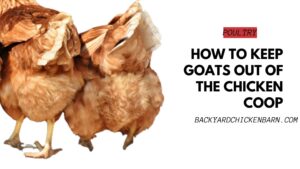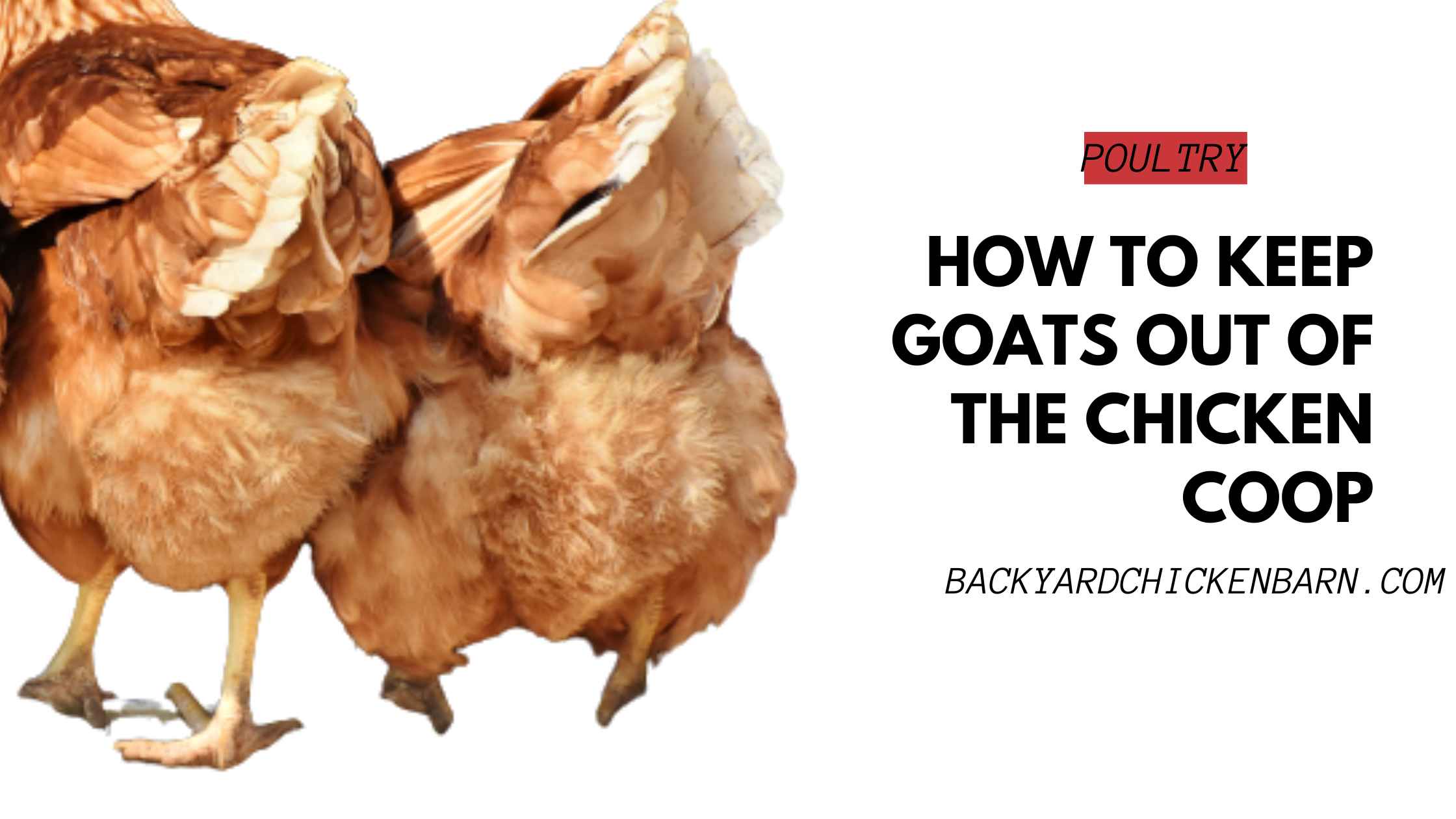How to Keep Goats Out of the Chicken Coop
Having both goats and chickens on the farm can be a delightful experience. They each bring their own set of benefits, and with my love for animals, the more, the merrier! But, combining the two poses a unique challenge: keeping goats out of the chicken coop.
This was an issue I grappled with when I first started my farming journey, and I’ve since found innovative ways to keep the peace.
For those of you facing the same challenge, the direct answer to your question is: the most effective method is to create barriers.
By establishing strong, goat-proof fencing and secure gates, you ensure your goats can’t access the chicken coop.
However, it’s not just about erecting barriers but about understanding the animals’ behavior and tendencies, and coming up with tailored solutions.
Understand the Curiosity of Goats
Firstly, goats are curious creatures. Their inquisitiveness often leads them to explore, and if they find chicken feed, they’ll keep coming back. Understanding this was my first step.
I realized that I needed to keep all chicken food securely stored and out of reach from my goats. Sealable containers or locking feed rooms can be an excellent solution here.
Elevate the Chicken Coop
Another innovative approach I took was elevating my chicken coop. Chickens can easily move up and down ramps, but goats, being heavier and less agile in this regard, find it harder.
The elevated design not only kept my goats at bay but also added an extra layer of protection for my chickens from ground-based predators.
Strong Fencing is a Must
Goats are known for their incredible ability to climb and jump. I invested in high fences (at least 4 feet tall) with a mesh design to prevent them from getting a foothold. Electric fencing, while more of an investment, proved very effective.
A mild shock deterred my goats without causing them harm.
Secure Entry Points
It wasn’t just the coop’s main entrance; I had to ensure that all potential entry points, like windows and vents, were secured. Reinforced latches and locks were a game-changer.
Distractions Work Wonders
To divert my goats’ attention from the coop, I set up play areas for them, complete with climbing structures and toys. This reduced their interest in the coop and kept them occupied elsewhere.
Regular Supervision
Lastly, spending time observing and interacting with my animals provided valuable insights. I noticed patterns in their behavior, which helped tweak my strategies.
To conclude, keeping goats out of the chicken coop requires a blend of strong physical barriers and behavioral understanding. With patience and persistence, harmony between your chickens and goats is absolutely achievable. It certainly was for me!
ALSO SEE: How to Keep Ants Out of Chicken Coop

FAQs on Keeping Goats Out of the Chicken Coop
1. Why are goats attracted to the chicken coop?
Goats are naturally curious creatures, and they might be attracted to the chicken feed or the coop itself.
2. How high should the fences be to deter goats?
A minimum of 4 feet tall is recommended, but higher is better if your goats are particularly agile.
3. Can goats climb up to elevated chicken coops?
While goats are good climbers, they find it hard to climb narrow ramps leading to elevated coops.
4. How do I secure the chicken food from goats?
Use sealable containers or locking feed rooms to store chicken food.
5. Will electric fencing harm my goats?
No, a mild shock will deter them without causing harm.
6. Can chickens easily adapt to elevated coops?
Yes, chickens can easily move up and down ramps.
7. Are there other benefits to elevating a chicken coop?
Yes, elevated coops also offer protection from ground-based predators.
8. How can I secure the coop’s windows and vents from goats?
Reinforced latches and locks on all entry points will prevent goats from gaining access.
9. What kind of toys can distract goats?
Climbing structures, balls, and other play items can keep goats occupied.
10. How often should I supervise my goats and chickens?
Regular observation helps notice patterns and adjust strategies as needed.
11. Why are goats curious about chicken coops?
Their natural inquisitiveness leads them to explore new areas, especially if there’s food.
12. Will goats harm chickens if they enter the coop?
While not typically aggressive, goats can unintentionally harm chickens due to size difference and disrupt their environment.
13. Can goats eat chicken feed?
While they can, chicken feed isn’t formulated for goats and can be harmful if consumed in large amounts.
14. How do climbing structures for goats help?
They provide an avenue for goats to expend energy and satisfy their climbing instincts.
15. Are there specific fence materials that work best?
Mesh designs can be effective as they prevent goats from getting a foothold.
16. How can I tell if my fence is high enough?
If your goats aren’t jumping over or trying to climb, it’s likely sufficient.
17. Can I combine the play area for goats near the chicken area?
It’s best to keep them separate to reduce the goats’ interest in the coop.
18. Why do goats find chicken feed appealing?
Chicken feed often contains grains and nutrients that goats might find tasty.
19. Do all goats try to enter chicken coops?
Not all, but many goats will out of curiosity, especially if they sense food.
20. How do locks on windows and vents help?
They reinforce entry points, making it harder for goats to break in.
21. Can I use natural deterrents to keep goats away?
Physical barriers and behavioral strategies are more effective than natural deterrents for this purpose.
22. Will making the chicken area visible to goats deter them?
Not necessarily. Goats might still try to access it out of curiosity.
23. How does observing the animals help?
Understanding their behavior patterns can offer insights into keeping them separated.
24. Is it costly to set up these barriers?
While there’s some investment involved, the peace of mind and protection of your animals make it worthwhile.
25. Do elevated coops have disadvantages?
They might require more effort to clean and maintain but offer many advantages in terms of security.
26. How can I train my goats to stay away from the coop?
Consistent redirection, combined with barriers and distractions, can train goats over time.
27. Are there breeds of goats less likely to disturb chicken coops?
While individual behaviors vary, the curiosity trait is common across goat breeds.
28. Will roosters deter goats from entering the coop?
Roosters might be more territorial, but a determined goat can still enter the coop.
29. Can I use alarms to scare off goats?
While possible, it might also stress the chickens. Physical barriers are more effective.
30. How do I handle aggressive goats near the coop?
Secure fencing and proper training can help. If a particular goat is very aggressive, consider separate housing.
31. Is it okay to let goats and chickens free-range together?
They can free-range together, but ensure the chicken’s safety and access to their coop without goat interference.
32. Will goats disturb chicken nests?
Yes, goats entering the coop might disturb nesting areas and potentially harm eggs.
33. How do I introduce new chickens to the coop with goats around?
Ensure barriers are already in place and introduce new chickens during a time when goats are distracted or secured.
34. Do goats get used to chickens over time?
Over time, with consistent training and boundaries, goats can become accustomed to chickens without causing disturbances.
35. Can motion sensors help in keeping goats away?
They can act as a deterrent, but physical barriers are more reliable.
36. How do I handle baby goats around the coop?
Baby goats are even more curious. Ensure they’re securely fenced in or supervised when near the coop.
37. Can chickens and goats share water sources?
They can, but ensure the water source isn’t located near the coop entrance to prevent goats from getting too close.
38. What should I do if a goat gets trapped in the coop?
Stay calm, secure other animals, and carefully guide the goat out. Afterward, identify and fix the breach.
39. How do elevated coops protect against other predators?
Elevated coops make it harder for ground-based predators, like foxes or raccoons, to access.
40. Can I consult a local farmer for more advice on this topic?
Absolutely! Local farmers with experience in raising both goats and chickens can offer valuable insights based on their experiences.


